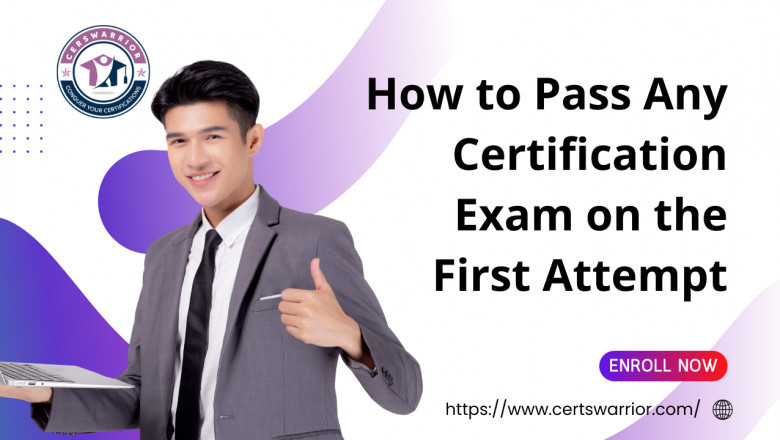views
Earning a professional certification can significantly enhance your career prospects, validate your expertise, and open doors to new opportunities. However, the journey to certification success requires strategic preparation and a focused approach. This comprehensive guide outlines proven strategies to help you pass any certification exam on your first attempt.
1. Understand the Exam Structure and Objectives
Begin by thoroughly researching the certification exam's structure, including the number of questions, types of questions (multiple-choice, case studies, simulations), time limits, and passing scores. Most certifying bodies provide detailed exam blueprints or objectives that outline the topics covered. Familiarizing yourself with these details will help you tailor your study plan effectively.
2. Develop a Structured Study Plan
Creating a realistic and structured study plan is crucial. Break down the exam objectives into manageable sections and allocate specific timeframes to study each topic. Consistency is key; aim for regular study sessions, and incorporate periodic reviews to reinforce your understanding. Utilizing techniques like the Pomodoro Technique—studying in focused intervals with short breaks—can enhance concentration and retention.
3. Utilize Multiple Study Resources
Diversify your study materials to gain a comprehensive understanding of the subject matter. Combine official study guides, online courses, textbooks, and practice exams. Engaging with various resources can provide different perspectives and explanations, aiding in deeper comprehension. Additionally, participating in study groups or forums can offer valuable insights and support.
4. Engage in Active Learning
Active learning techniques, such as summarizing information in your own words, teaching concepts to others, and applying knowledge to practical scenarios, can significantly enhance retention. Creating flashcards, mind maps, and practice quizzes are effective methods to reinforce learning. Regularly testing yourself on the material helps identify areas that require further review.
5. Practice with Mock Exams
Simulating the exam environment through practice tests is an effective way to assess your readiness. Practice exams help familiarize you with the question format, improve time management, and identify weak areas. Aim to complete multiple full-length practice exams under timed conditions to build confidence and reduce exam-day anxiety.
6. Focus on Weak Areas
After identifying your weak areas through practice tests, dedicate additional time to review and strengthen these topics. Utilize targeted study materials, seek clarification from instructors or peers, and engage in focused practice to improve your understanding. Addressing weaknesses proactively enhances overall performance.
7. Maintain a Healthy Study Routine
Balancing study with self-care is essential for optimal performance. Ensure you get adequate sleep, maintain a balanced diet, and incorporate physical activity into your routine. Regular breaks during study sessions prevent burnout and improve concentration. Mindfulness practices, such as meditation and deep breathing exercises, can also help manage stress.
8. Prepare for Exam Day
As the exam day approaches, finalize your preparations by reviewing key concepts and summarizing essential information. Ensure you have all necessary materials ready, such as identification, admission tickets, and permitted tools. Plan your route to the exam center to arrive early and avoid last-minute stress. A good night's sleep before the exam is crucial for cognitive function.
9. Employ Effective Test-Taking Strategies
During the exam, read each question carefully and manage your time efficiently. Answer questions you are confident about first, then return to more challenging ones. Use the process of elimination to narrow down answer choices. If unsure about an answer, make an educated guess rather than leaving it blank, as unanswered questions may be marked incorrect.
10. Reflect and Learn Post-Exam
After completing the exam, take time to reflect on your preparation and performance. Regardless of the outcome, analyze what strategies worked well and what could be improved. This reflection is valuable for future certifications and continuous learning.
For more resources and support in your certification journey, visit CertsWarrior.













Comments
0 comment